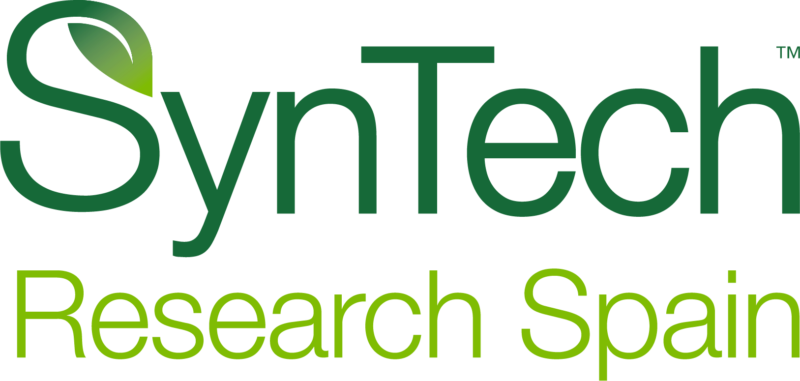BIOEFFICACY
(GEP)
Biopesticides
SynTech Research has delivered very many successful trials with Biopesticides for the control of pests and diseases. Agents tested include:
Macrobials – Invertebrate Biocontrol Agents (IBCAs) – Insects, mites and entomopathogenic nematodes.
Microbials and Microbial Biocontrol Agents (MBCA) – bacteria, fungi and viruses (and beneficial soil micro-organisms).
Trials are also conducted on Insect pheromones/ semiochemicals.
Studies are conducted on an extensive range of arable and horticultural crops, using its worldwide network field stations in over 30 countries. These include screening and evaluation in laboratories/glasshouses/growth chambers and trials at the field stations and in commercial fields. Techniques include syringe application and chemigation with tailored irrigation systems – flood, sprinkler and drip.
Studies have included laboratory, glasshouse and field programs, against pests, diseases in
- Corn (Heliothis, Rice (Chilo), Pome and Stone fruit (Cydia, Anarsia, Monolinia, Coryneum,
- Vines (Lobesia, Uncinula, Plasmopara, Botrytis, Phomes)
- Citrus (Ceratitis, Panonychus, Aonidiella, Penicillium, Botrytis), Bananas (Sigatoka)
- Tomato, Lettuce, Cucumber, Peppers, Strawberries, Artichokes (Nematodes, Pseudomonas, Phytophtora, Pseudoperonospora, Alternaria, Sclerotinia, Penicillium, Bremia, Botrytis, Pythium, nematodes
Materials tested include:
- Bacillus thuringiensis, B. subtilis, Trichoderma, yeasts and other fungi
- Semiochemicals and other natural products (pheromones, attractants, repellents, oils, Renoutria extract)
Biostimulants
SynTech conducts the range of studies required to determine where and how the potential product works, to provide data for clients make robust claims. Test types include, yield and quality enhancement, improve abiotic stress tolerance, (drought, heat, light, salinity, wind), plant nutrition, early crop emergence, fruit setting, root system development and quality.
Appropriate techniques and testing protocols are designed and studies are conducted on an extensive range of arable and horticultural crops, using our worldwide network of field stations in over 30 countries. Tests include screening and evaluation in laboratories/glasshouses/growth chambers and trials at the field stations and in commercial fields.
Application techniques:
Syringe application and chemigation with tailored irrigation systems – flood, sprinkler and drip
Assessments:
Agronomy – Crop vigour, key crop development stages: early blooming, fruiting, harvesting, crop development: precocity at any stage.
Crop height, stem diameter, leaf size
Analyses – Yield and quality: average weight, grading, size; nutritional value: protein, polyphenol, fatty-acids, fiber content. Brix, acidity, starch, conservation (post-harvest): Ca++ content, hardness, acidity.
Crop Nutrition – deficiency, efficiency in nutrient absorption
Photosynthetic activity (SPAD / chlorophyll), foliar analysis: micro / macro element determination
Other services:
Nutritional maps (GIS/NDVI), Pre- and post-harvest quality / shelf-life
Bio-Seed treatment, germination tests, emergence precocity & other growth stages
Seed coating tests Early screening tests
SynTech’s scientists have evaluated an extensive variety of candidate products for growth enhancement and quality improvement, in laboratory, glasshouse and field programs on:
- Cereals and Soya (growth enhancement, drought resistance)
- Pome and Stone fruit and vines (fruit quality),
- Tomato, Lettuce, Cucumber, Peppers, Strawberries, Artichokes (flowering and growth enhancement, drought resistance).
Early stage screening
SynTech Research provides early stage Discovery screening services for Agrochemicals Biopesticides and Biostimulantsacross a broad range of crops, pests and microorganisms.
Our International Teams are led by Dr. Parsa Tehranchian at our Technical Center in Sanger (California) with additional teams in Nimes (France) and Valencia (Spain). These offer high-throughput screening for herbicides, insecticides, bactericides, fungicides, plant growth regulators, fertilizers, adjuvants, biopesticides, biostimulants and fertilizers.
We assist clients by providing screening and selection of exploratory materials, using relevant techniques for different targets, to understand their properties and make selections for further evaluation.
Laboratory and greenhouse studies, e.g. on heat stress, drought stress and enhanced pesticide tolerance are used for selecting preferred materials for progression. Our microbiological techniques allow screening of seed treatments with engineered microbes for crop protection and production.
Resistance monitoring
SynTech offers testing programs for resistance and cross-resistance to other Modes of Action (MOA). Our fully equipped analytical and radiochemical laboratories allow characterization of molecular and physiological resistance mechanisms.
Herbicide Resistance Screening
Our unique expertise and large weed seed collection, including herbicide-resistant grass and broadleaf weeds (e.g. groups 1, 2, 9, 10, 22 populations or biotypes) allow testing of Pre- and Post-emergence herbicides in greenhouse and field trials, including micro-plots for testing small amounts of new herbicide candidates.
Insecticide and Fungicide Resistance Screening
SynTech Research has earned a reputation with agrochemical companies for its insecticide and fungicide early stage screening. Our programs cover method development and validation services to assess pesticide properties of compounds against a wide range of targets including pesticide-resistant insects and diseases. These allow selection of potential molecules for dose-response studies through to advanced greenhouse trials.
Please contact us to learn more about our global capabilities in this area of R&D
Mr. Francisco López, Iberia Managing Director
email: flopez@syntechresearch.com
Mr. Eric Ythier, Global Sales/Marketing Director
Email: eythier@syntechresearch.com
For information on SynTech’s Biopesticide, Biostimulant and Resistance Testing capabilities, please see the relevant links on our Bioefficacy (GEP) Services webpage.
